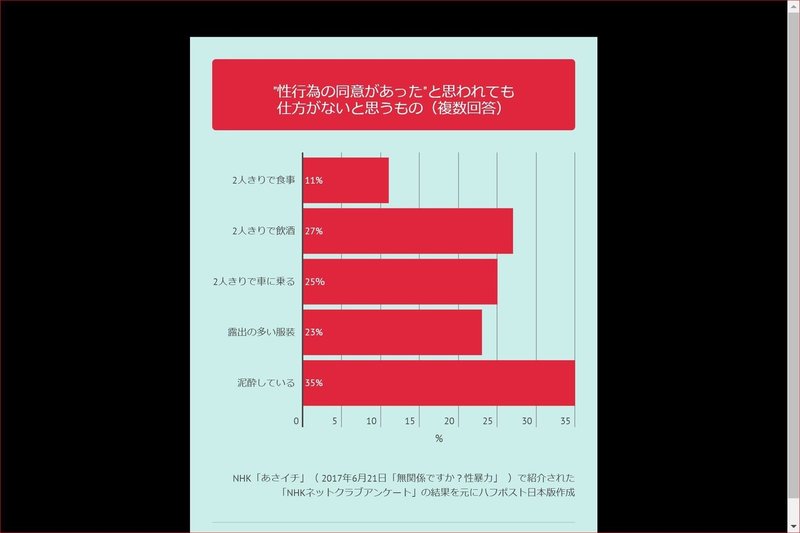
What I really wanted to tell in the @GlobalVoices 'introductory' #MeToo story on Japan (4/4)
Last updated: 2019/2/10 | Original Japanese
#MeToo in #Japan (Part 4) - The issue of sexual consent
Another complicating factor surrounding both Shiori's case and Meiri's case is the issue of consent. Shiori suspects that she has been drugged via a 'date rape drug', and Meili has been reportedly intoxicated through over two hours of forced drinking, according to her own account on Twitter.
First Tweet: “ #MeToo Last October, another Voice Actress friend called me up saying, "We're drinking with a theatrical producer. Won't you come? Please come!" and I fell for it. At midnight at Karaoke place we started a game with penalty to drink sake. And the game forced us to drink even if your resist it"
Second Tweet: "The game continued for more than 2 hours, and then I was completely intoxicated, taken to a hotel, and he undressed me while I could not move and forced himself into me. I cannot elaborate on the details here because it's too real, but I couldn't tell anyone, not my parents, not my friends, because I was too afraid. I spent the whole week, shutting myself out from the outside world in my own room, eating nothing, and just kept on crying."
The issue of sexual consent
In either case, the victim has to prove that she was actually incapacitated, and incapable of making any sensible decisions or much less explicit or implicit consent to having any sexual acts with the alleged assailant.
In her own article in Politico, Shiori wrote:
According to a 2017 poll by NHK, Japan’s national broadcaster, 27 percent of respondents believed that sharing a private drink signaled sexual consent, while 25 percent took getting into the same car as a sign.

With this backdrop where society in general has only a limited level of awareness, the task of telling the importance of sexual consent seem almost impossible. However, a legal expert has recently provided a compelling argument on this contentious issue.
A legal take on the issue of sexual consent
"The requirement of consent should not be regarded as forming a central part of discussion on [what constitute] sexual crimes," says Hisashi Sonoda, a lawyer and professor at the Konan University Law School who specializes in criminal jurisprudence.
In a recent article in the monthly political magazine Sekai republished in the Yahoo! News (Japan), Prof. Sonoda pointed out that the false belief that the victim had consented to having sex with the alleged does not translate to meaning that the assailant did not have the intent on committing a sexual crime.
"The false belief that a woman has consented to engage in a sexual act does not translate to mean that there was no intent on [the offender to] committing a sexual crime."
Professor Sonoda explained using several legal terms unique to Japanese criminal law, such as "inability to resist" (kokyo funou; 抗拒不能) or "quasi-forced sexual intercourse" (jyun-kyosei seikou; 準強制性交) citing court cases. The latter term is the new legal term used to describe 'incapacitated rape' which was previously known as "quasi-rape" (jyun-goukan; 準強姦) after the law was amended last July.
“It is understood that ‘Inability to resist’ means ‘a condition where resisting is markedly difficult’ (according to judicial precedent). This is interlinked with the [legal] understanding that the degree of assault or intimidation need not be strong enough to completely prevent the resistance of the victim but can be weaker and still constitute a criminal act.”
Sonoda continues.
“Of course this is a relative determination, so circumstances such as the aspects of the assault and/or intimidation, condition of time and/or location, age, mental state of the victim, etc., is taken into account to make an objective determination.”
Then he explains specifically about "quasi-forced sexual intercourse," which applies to both Meili and Shiori's rape cases.
“Even in the cases of quasi-forced sexual intercourse, the element of sexual consent is confirmed through careful examination of circumstantial evidences, ranging from the type and amount of drugs used, the amount of alcohol consumed, the circumstances leading up to engaging in sexual acts, and the nature of relationship between the victim and the alleged assailant. However, not being able to reject or resist a sexual act while obnubilated [unconscsious] shall not be considered an element for judgment of "Inability to resist" because it could misconstrue the essence of the whole debate [on the matter of sexual consent].”
Finally, Sonoda argues that if the offender insists that there was indeed a consent from the victim, such an argument must be carefully examined whether it can objectively warrant that there was a 'probable cause'.
"If the offender insists that the woman has consented, such an argument must be carefully examined as to whether it is objectively convincing; in other words, whether it can objectively warrant that there was a 'probable cause'. And such 'probable cause ' can only be presented in a form of concrete evidence that can be sustained in the court hearings as viable. Otherwise, the counterargument that argues the existence of consent must be rejected."
All this could happen IF the victim is able to convince the investigators and/or prosecutors that there indeed is a 'probable cause' on his/her side to go to the next stage; a trial. But despite the differences in the circumstances of their crimes, Meili's case was not pursued and Shiori's was, but dropped by prosecution for 'lack of evidence'. There is a long haul between filing a complaint, being accepted, investigated, prompting an arrest, and then prosecuted, to reach a trial, which seems promising according to Sonoda's professional assessment if it is applied in real-life court cases at all.
Unfortunately, only a very few of the victims (reported or unreported) have enjoyed that opportunity until today, including Shiori and Meiri.
A message for the unheard MeToos in Japan and around the world
As part of her interview with Global Voices Meili wanted to send a message to the survivors of all forms of sexual assault, the still unheard “MeToos” around the world:

noteをご覧くださりありがとうございます。基本的に「戦う」ためのnoteですが、私にとって何よりも大切な「戦い」は私たち夫婦のガンとの戦いです。皆さまのサポートが私たちの支えとなります。よろしくお願いいたします。
